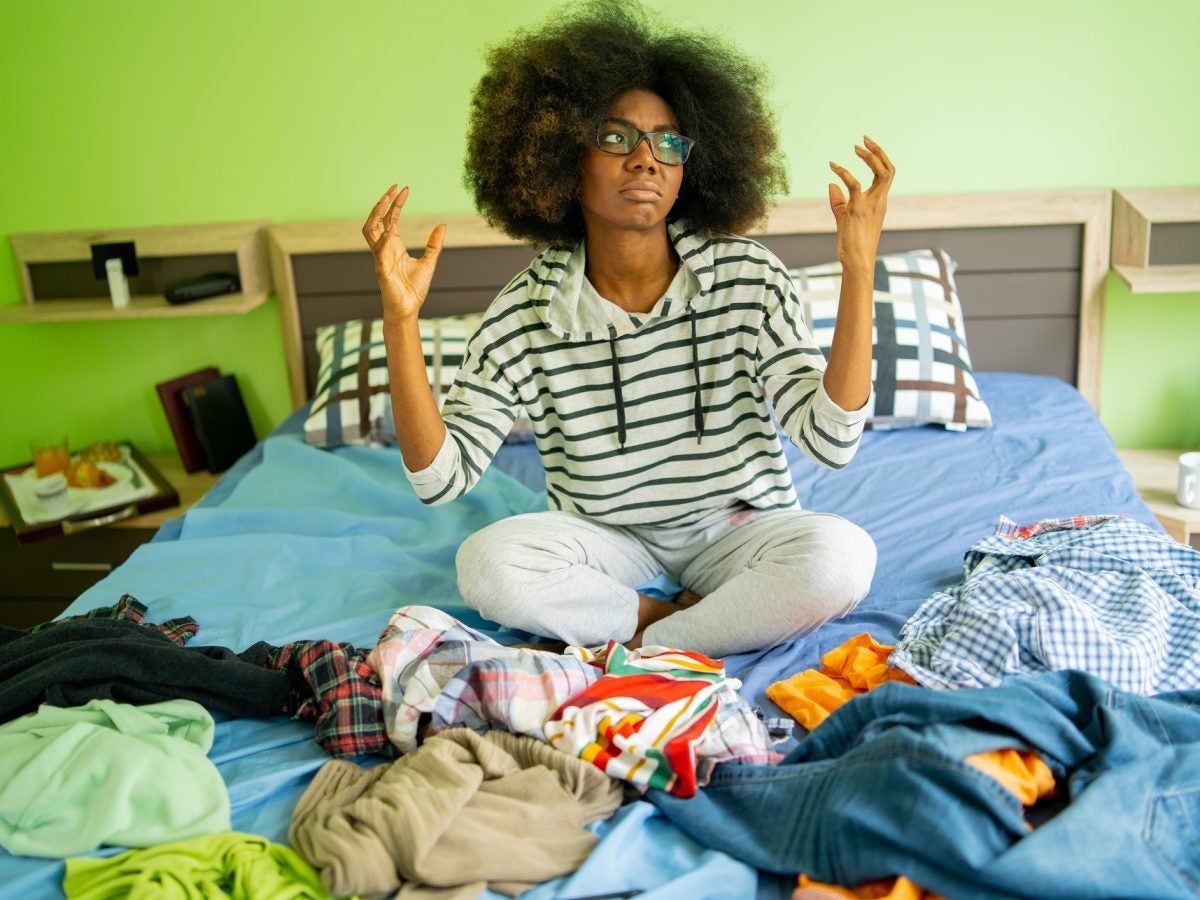
Ever sit in a space trying to think or relax and found yourself feeling irritated, distracted or on edge instead? If you’re tripping over items, have a never-ending pile of clothes you’re rummaging through, or are guilty of an overflowing storage, that could be one reason why. A study published by researchers from the Princeton Neuroscience Institute looked at the effects of living environments that were organized and clutter free. The study found that untidiness affects your ability to focus and process information.
To take it a step further, beyond affecting your focus, clutter can also affect your self-esteem and mood. After looking at 32 families, researchers at UCLA’s Center on Everyday Lives and Families (CELF) found a link between high cortisol and women who had lots of household objects at home.
Kenika Williams, founder and organizer of Tidied by K, a professional organizing company based in Atlanta, says she notices some of the aforementioned effects of clutter on her clients. “The common themes I see amongst my clients are clutter accumulation and excessive buying. By the time my clients reach out for help and support, they are already dealing with overwhelm, anxiety, and massive levels of stress when it comes to keeping up with their homes and other responsibilities.”
So, what to do if you have clutter you can’t seem to shake? Three professional organizers give us some tips below.
Start Small
This first step to getting rid of clutter probably isn’t rocket science, but it is something people may easily struggle with. A 2019 survey by ApartmentGuide found clutter was the most annoying type of mess that about 1,000 respondents said they had in their house. Another study also found that most Americans have no clue what to do with such mess.
There are many approaches to decluttering, but a first step is creating a game plan or strategy.
“If you are feeling overwhelmed with decluttering your space, break it down into smaller, more manageable tasks,” says Katherine Picott, professional home organizer and certified KonMari consultant based in Columbia, Maryland. She also recommends tidying by category vs. room, getting support from friends by setting up decluttering challenges and shifting your focus from how much you can get rid of to what you want to keep.
You may also try the 12-12-12 challenge, which is when you find 12 items to throw away, 12 to donate, and 12 to put back in their place.
Create Productive Habits and Routines
Simply decluttering is a good first step to organizing your space, but it may not be enough to keep the junk away. For long-term changes, you may need to develop productive habits and routines so you can stay organized, says Williams.
“Habits and routines are what make resetting your home back to baseline manageable and more realistic, even when life gets busy, stressful, and overwhelming.” She provides examples of routines such as wiping down your counter right after doing your makeup every morning or putting away laundry every Sunday afternoon.
“Sticking to a routine and incorporating a bit of structure into your week will make staying organized feel more manageable, as you won’t be tackling 10 different household chores at once,” she explains.
You could also put a decluttering routine in place, which could mean looking for things you need to get rid of once a month or quarter.
Try the S.O.R.T It Method
Shani Hinton, a professional home organizer based in Washington, has a method she uses with clients to help them declutter and stay organized. “I use a simple acronym to help guide you to organizing your spaces in an effort to reduce stress and anxiety. I like to call it…. S.O.R.T. it,” she shares. Below is a breakdown of the method that you can try in your space.
S: Sort your space or rooms by purging the things that you no longer need or want.
O: Organize your space with like items or group them in categories that make sense to YOU.
R: Redesign your space with your newly organized groups/items using products or systems that work best for your everyday routines.
T: Therapy! Talk to a professional organizer to coach you through the organizing process.
Use Organizing Items
Having the right items at home can help you stay organized. If you don’t already, use organization or storage items to create a “home” for all of your things. Before running to Target, Picott recommends looking around your house for items you can use. “You will be surprised by what you can repurpose,” she tells ESSENCE.
She continues, “If you do decide to purchase items to enforce the new organization systems in your home, be sure to measure the space first, then shop.”
In case you’re stuck on the best items to buy, Williams has a few suggestions. You can try honeycomb dividers, adjustable drawer organizers, or clutch organizers for your closet. For more general spaces, turntables and sectional acrylic organizers can help you keep things in place.
Hire a Professional
After trying all of the DIY tips above, it is possible that you’ll still struggle to get rid of clutter and keep your space organized. If this is the case and you still feel stressed, overwhelmed or anxious, it may be time to seek the help of professionals, Williams says.
She explains that they can save you time as they use tried and true processes. It may also be a good idea to think about whether you need the support of a therapist if you’re using clutter as a coping mechanism or find extreme moods keep you from managing your space.
If you’re beating yourself up or feeling ashamed about needing help, you definitely shouldn’t.
“Deciding to hire a professional organizer is not an admission of guilt or defeat,” Williams explains. “It’s a sign of discernment to know and understand that you need the support of someone who has a plan to help you achieve your goals.”